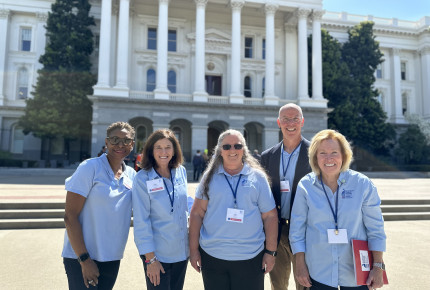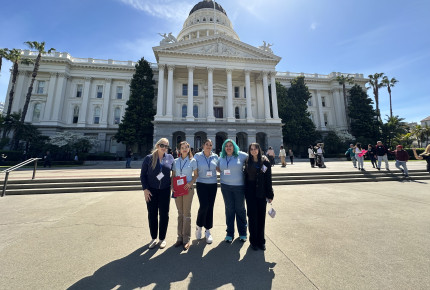Sacramento, Calif. — Over 100 American Cancer Society Cancer Action Network (ACS CAN) volunteers from across California rallied at the Capitol on Wednesday and urged lawmakers to pass legislation that would allow more people to access the state’s breast and cervical cancer screening and treatment programs.
Senate Bill 1213, introduced by Sen. Toni G. Atkins (D-San Diego) and sponsored by ACS CAN, would expand eligibility for the Every Woman Counts (EWC) program and the Breast and Cervical Cancer Treatment Program (BCCTP) by increasing income eligibility from 200% of the federal poverty level (FPL) to 300%. Currently, 33 states cover individuals with incomes up to 250% FPL and five states cover individuals with incomes up to 300% FPL or more, placing California in the bottom 20% of coverage levels.
“Every year, on California Cancer Action Day, we meet with our legislators to remind them that with their help, we can save lives from cancer,” said Jamie Escoto, ACS CAN State Lead Ambassador. “In California, an estimated 4,570 people will die of breast cancer this year alone. This means we lose more than 12 people to this disease every day. Legislators can help more Californians detect breast and cervical cancer at an early stage -- when it is easier to treat and chances of survival are higher -- and get the treatment they need if cancer is found.”
Starting this year, people who were previously ineligible due to their immigration status can now be covered by Medi-Cal. As a result, most of those without a satisfactory immigration status who relied on EWC and BCCTP no longer need coverage under these programs. Yet, uninsured or underinsured individuals with income above 200% FPL do not qualify for EWC and BCCTP services and still may not have access to affordable health care.
“Communities of color and people with limited income are less likely than others to receive timely cancer screenings and follow-up care, resulting in striking cancer disparities. For example, Black women are 40% more likely to die from breast cancer despite lower incidence. It is critical that legislators take this next step to keep California moving toward universal care and ensuring everyone has a fair and just opportunity against cancer," said Autumn J. Ogden-Smith, California Legislative Director for ACS CAN.
The group of advocates also asked legislators to support two bills that would address the illegal sale of flavored tobacco products.
Assembly Bill 3218, introduced by Assemblymember Jim Wood (D-Healdsburg), would establish a public list of tobacco products that are permissibly unflavored and allowed to be sold in California, clarifying which products are defined as contraband and subject to seizure and fines.
Senate Bill 1230, introduced by Senator Susan Rubio (D-Baldwin Park), would grant the California Department of Tax and Fee Administration the authority to seize and destroy illegal flavored tobacco products discovered during inspections of locations where tobacco products are sold or stored. SB 1230 would also increase the civil penalties for retailers who sell illegal tobacco products and tobacco products to people under 21 years old.
“These bills will help ensure that the law that ended the sale of flavored tobacco products is implemented as the legislature and voters intended. Holding bad actors accountable is crucial to protect kids from tobacco initiation and reduce tobacco use, which is essential to stem tobacco-related diseases, including more than a dozen types of cancers,” said Ogden-Smith.
Free resources and services on quitting tobacco products are available at KickItCA.org in English and Spanish. For help in Cantonese, Mandarin, Korean and Vietnamese, visit asiansmokersquitline.org.


